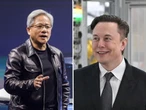The capitulations arrived one after another, a line of white flags growing longer by the week. First Tractor Supply Co., then John Deere, then Harley-Davidson and Brown-Forman (the distillery giant behind Jack Daniel’s) and Ford, followed by Lowe’s and Molson Coors and, more recently, Caterpillar. Each publicly traded company—all of them household names—announced a retreat or reversal or outright abandonment of diversity, equity, and inclusion policies after facing online criticism from conservative activist Robby Starbuck.
Starbuck has been railing against so-called wokeness for years. Up until about a decade ago, he was a music video director, working with the likes of Eve and Snoop Dogg. But his increasingly vocal conservative opinions didn’t do wonders for his career in Hollywood, so in 2019 he pulled a reverse Clampett, loading up the truck in California with his wife and children and moving to Tennessee.
During the height of the pandemic, from his new perch near Nashville, he launched social media campaigns against mask and vaccine mandates. Backed by Paul Rand, he ran unsuccessfully for Congress in 2022. He produced a 2024 documentary opposing gender-affirming care called The War on Children that has been celebrated in right-wing circles and endorsed by Elon Musk. Starbuck’s eager audience—more than a million followers across X (owned by Musk), Instagram, YouTube, and Facebook—laps up his diatribes against DEI.
His June rant on X, against Tractor Supply for sponsoring Pride festivals and committing to carbon-emission reduction goals (among other “offenses”), racked up 2.8 million views. His tirades against John Deere for the company’s DEI efforts garnered hundreds of thousands of additional views. When Fast Company reached out to Starbuck recently to ask why he has chosen to target these particular companies for their DEI policies, he responded via email: “Because I’m smart.”
Smart enough, alas, to know that four years after George Floyd’s murder prompted a social awakening across America and a proliferation of corporate commitments to DEI, the cultural pendulum was poised to swing back. Right wingers were incensed that one of President Biden’s first official acts on after having been inaugurated was to reverse Donald Trump’s 2020 executive order banning federal agencies and contractors from conducting DEI training. And the Republican Party’s current platform promises to fight against “gender indoctrination” and critical race theory.
But even in this sea of right-wing aggrievement, Starbuck’s crusade stands out. Like other conservative crusaders (Stephen Miller, the American Family Association), he’s going against individual companies, and while his targets span sectors, most of them have something in common: They’re perceived to be “masculine” brands. Whatever you may think about Starbuck’s bluster, by connecting the DEI movement with the supposed “war on men,” he has tapped into a very real—and very complex—anxiety that American manhood is under attack.
While Starbuck’s motivations may be political, his campaigns are succeeding because they resonate on a deeper, emotional level. Richard Reeves, author of the 2022 book Of Boys and Men and the founder of the American Institute for Boys and Men (a non-partisan nonprofit), believes that men today are feeling socially excluded due to a variety of factors. They are increasingly distanced from their children as a result of higher divorce rates and custody agreements, he explains. They are on the wrong end of the gender education gap, as women currently earn 58% of U.S. bachelor degrees. And they’re leaving the workplace in alarming numbers and turning to drugs, alcohol, and suicide.
“The old script for what it meant to be a boy or a man, and what role you were going to play in society, has been torn up by the changes of the last 40 years, as has the old female script,” Reeves says. “But we haven’t replaced the old male script. That leaves a lot of men adrift.”
In the script that Robby Starbuck is writing, DEI initiatives are yet another mechanism that undermines men. (Well, white men, anyway.) And for Starbuck, these initiatives are especially egregious when employed by brands that have built their identities around conventional notions of masculinity.
Harley-Davidson must have been an especially tantalizing bull’s-eye. The iconic 121-year-old Milwaukee-based motorcycle company made its reputation in part by positioning men as rebels and thrill seekers and women mostly as attractive ornaments for their bikes. But in recent years, the company had implemented a range of progressive initiatives, from establishing a corporate DEI department to supporting the Wisconsin LGBT Chamber of Commerce to purging pinup-girl merch from its official store. Jochen Zeitz, Harley’s CEO since 2020, previously served as the top executive at Puma and has throughout his career demonstrated a commitment to progressive policies, especially related to sustainability. (As a board member at Harley-Davidson, Zeitz served as chair of the sustainability committee the company established in 2011.)
When Starbuck launched his attack in July, a Harley dealership in Vermont countered with a long post on its website titled “Defending HD’s Legacy: Exposing Robby Starbuck’s Misguided Attacks.” For a moment, it looked like Starbuck might have provoked the wrong dude at the bar. For a moment, it looked like a company finally had the backbone to stand up for its professed values and announce it would continue to align with the non-white-male demographic that constitutes approximately 70% of the U.S. population (not to mention the very significant percentage of white American men who don’t feel threatened by somebody who doesn’t look exactly like them).
But a few weeks later, on August 19, Harley-Davidson caved, issuing an announcement that the company was ending its DEI commitments. Zeitz and Harley-Davidson did not respond to Fast Company’s request for comment, but the company’s capitulation to Starbuck speaks volumes. In bowing to Starbuck to avoid near-term controversy that might alienate some core customers and hurt next quarter’s numbers, all of these companies are ditching commitments to work toward a more equitable future. They appear to be operating out of fear.
One reason Starbuck has been so effective is that he reduces the debate to a matter of dollars and cents. He is constantly hammering home that DEI is a losing financial proposition for companies. “If DEI and supplier diversity quotas were making you money, do you really think Tractor Supply and now Harley-Davidson would drop those initiatives?” he asked in one video.
To those who believe in the power and value of diversity, equity, and inclusivity, the mass abandonment of DEI principles may seem like an act of cowardice. But it may also reflect the inability of companies to quantify DEI value. “I think the reason that they buckle [to Starbuck] is because they can’t confidently stand up and show the benefits, because they haven’t been tracking it well,” says Kristi Piehl, founder of crisis communications firm Media Minefield.
Even so, studies suggest that the public markets, at least, value these programs. A paper published in June by Hoa Briscoe-Tran, an assistant finance professor at the University of Alberta, in Canada, found that after Florida passed the Stop WOKE Act in 2022, which restricted workplace DEI programs, companies based in the state saw their stock price dip 1.8%. “On average, investors in the stock market think that restricting DEI initiatives actually hurt firms’ value,” Briscoe-Tran says.
Perhaps that explains why 86% of executives surveyed by Deloitte in 2023 said that embedding DEI into the workplace was important to overall success. And it’s not just the C-suite that’s on board: Sixty-one percent of Americans said in a recent Washington Post/Ipsos poll that it is “a good thing” for companies to establish DEI programs. Numerous studies, including those published by Harvard Business Review and McKinsey, have shown a strong correlation between a diverse workforce and successful innovation.
“More diverse teams and more inclusive workplace environments are associated with all sorts of good things: better innovation, better collaboration, better teamwork, better quality, better productivity,” says Lily Zheng, a DEI strategist and author of Reconstructing DEI. Revanchism, it turns out, doesn’t generally pay.
It’s also quite possible that whatever moves companies are making to fend off Starbuck do not reflect their actual DEI plans. Take John Deere: In the wake of Starbuck’s pressure campaign, the farming equipment behemoth announced it would ensure training materials no longer include “socially motivated messages,” but also that it would continue to “track and advance” the diversity of its personnel.
These recent DEI withdrawals are, ultimately, just as nebulous as some of the commitments were in the first place. Starbuck would be a fool not to realize that, but he may well not care. He has reportedly received thousands of tips from disgruntled workers hoping he’ll investigate their employer next. He is, after all, a political activist, and in the culture wars, winning the narrative—or, as Reeves would put it, writing the next scene of the script—is often the only victory that counts.









No comments